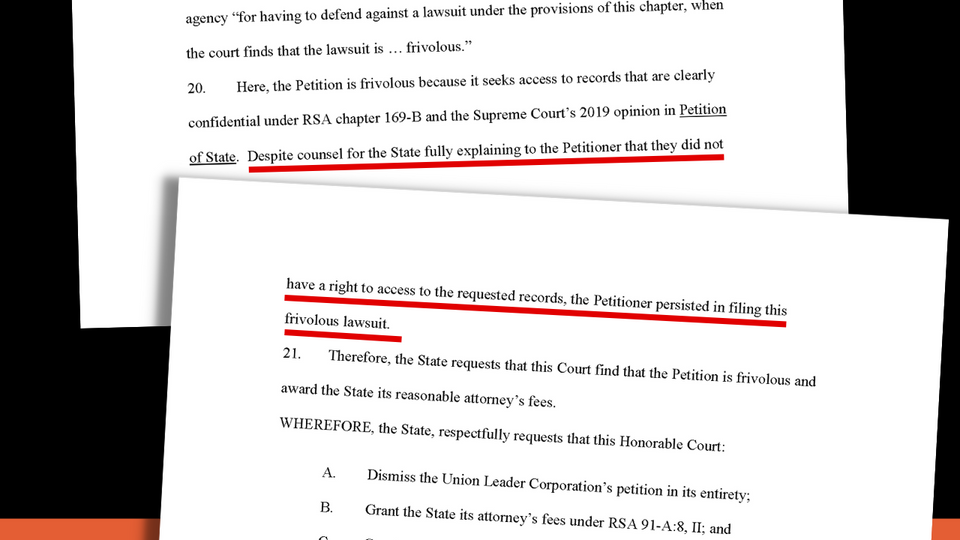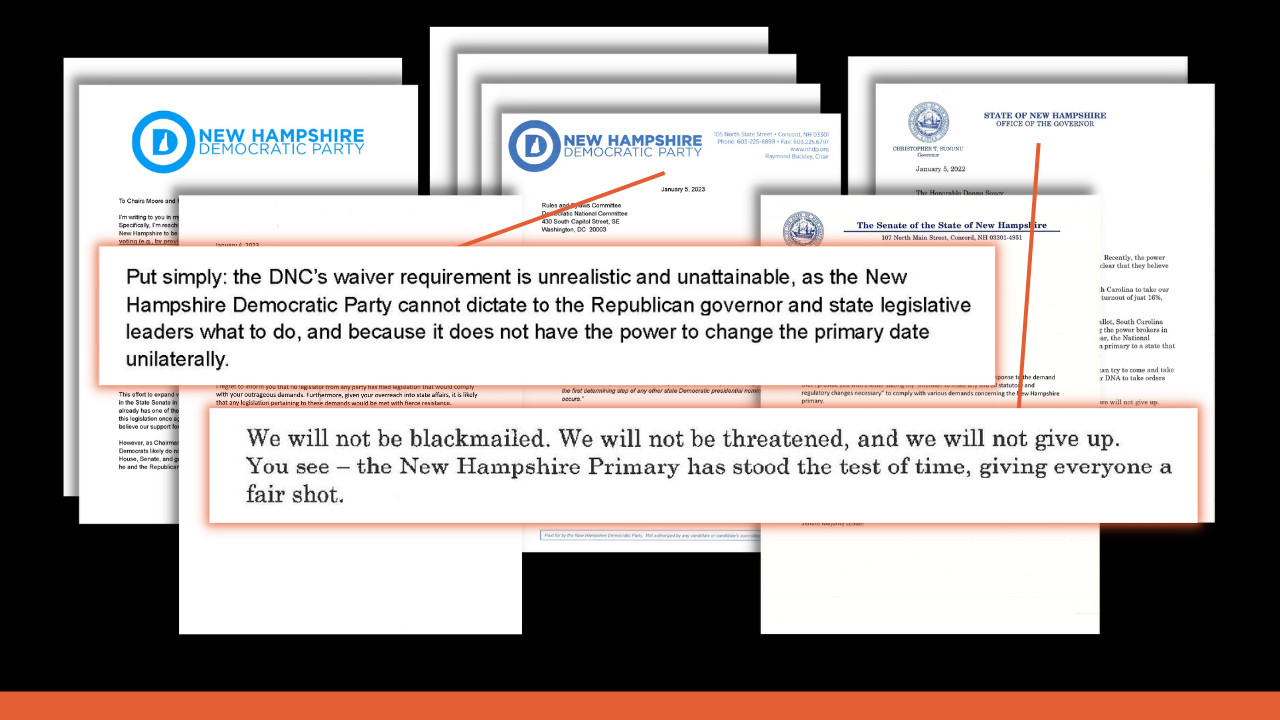State claims Union Leader lawsuit for NH State Police records is 'frivolous'

CONCORD — Unsatisfied with the way NH State Police responded to a reporter's public records request, the Union Leader filed a lawsuit last month that aims to force the government to fork over more information about what happened in October at the Sununu Youth Services Center.
An attorney for the newspaper said during a court hearing Wednesday that the records would further the news outlet's reporting on a timely topic of public interest, as lawmakers discuss legislation to postpone the planned closure of the tumult-stricken juvenile detention facility.
But an attorney for the NH Department of Safety claimed the newspaper's legal argument is so obviously wrong that a judge should dismiss the lawsuit, deem it "frivolous" and order the outlet to cover the state's attorney fees.
Here's a rundown of what's happened so far, according to court records:
- Reporter requests redacted records: Citing the NH right-to-know law, reporter Josie Albertson-Grove sent an email Oct. 13 to NH State Police, requesting "public records related to the state police response at the Sununu Youth Services Center on Oct. 7-8 2022, including any incident reports with confidential information redacted." In a story the following week, Albertson-Grove reported that police declined to talk about the details of their Oct. 7 activity at the facility. The director of the NH Division of Children, Youth and Families reportedly said the incident involved a scuffle and a teen reaching for a trooper's firearm. The facility has been dealing with disturbances and low staffing levels, reportedly including some injuries to staff and residents.
- Police say their hands are tied: In a Nov. 3 letter, NH State Police Lt. Brian V. Viglione told Albertson-Grove that "law enforcement investigative records pertaining to juvenile delinquency" have been deemed confidential. He cited a 2019 decision from the NH Supreme Court. Since the records are confidential under the state's "delinquent children" laws, they are also not available to the public under the state's right-to-know law, Viglione said.
- Attorney lobs lawsuit warning: Kathleen C. Sullivan, an attorney for the Union Leader, said in a Nov. 21 letter to Viglione that the police misapplied the 2019 precedent and relevant statutes. Either release the requested records within a week or be sued, Sullivan said.
- State says lawsuit would fail: In a Nov. 29 email that addressed Sullivan only by a shortened version of her first name, attorney David M. Hilts said the state is confident the 2019 precedent shows the Union Leader's threatened lawsuit would fail. Hilts, senior staff counsel for the commissioner's office in the NH Department of Safety, warned that the state "would be entitled to recover attorneys fees" under the right-to-know law.
- Union Leader sues anyway: In a lawsuit filed Dec. 7 in Merrimack County Superior Court, Sullivan argued that the NH Department of Safety has no valid basis to withhold the requested records. Confidential information should be redacted, and the rest should be released, the suit argues. "Union Leader seeks information about the response of a public agency at a state-run facility," the complaint states.
- State calls for suit's dismissal: The office of NH Attorney General John M. Formella responded Tuesday with a court filing signed by attorney Brendan A. O'Donnell. The filing, a motion to dismiss, claimed the lawsuit is "frivolous" and urged the judge to toss it out and order the Union Leader to cover the state's attorney fees. "Despite counsel for the State fully explaining to the Petitioner that they did not have a right to access to the requested records, the Petitioner persisted in filing this frivolous lawsuit," O'Donnell wrote.
- Parties spar in Concord courtroom: Sullivan and O'Donnell appeared Wednesday for a hearing before Judge John Kissinger, who took the matter under advisement and didn't immediately issue a decision on whether he would allow the litigation to proceed. Kissinger said the 2019 precedent includes broad language that would seem to support the state's reading, but he also posed questions about a variety of hypothetical scenarios that could illustrate flaws in the state's position. Kissinger didn't ask detailed questions about the alleged frivolity of the Union Leader's suit, and he gave Sullivan time to respond in writing to the state's motion to dismiss.
After the hearing, Sullivan said the state's allegation of frivolity lacks merit. Union Leader President and Publisher Brendan J. McQuaid declined to comment, deferring to Sullivan.
O'Donnell referred follow-up questions to NH Department of Justice spokesperson Michael S. Garrity, who said the department stands by the position argued in court and explained in court filings.
Police records exhibit court potential
Both parties in this case recognize that state law treats juvenile court records as confidential. But they disagree on how broadly that confidentiality should apply, especially when the records pertain to the operation of the juvenile justice system itself.
In the state's motion to dismiss, O'Donnell argued law enforcement agencies cannot publicly release documents — not even redacted records — that might later become part of a juvenile delinquency court proceeding.
"Incident reports from State Police, which detail State Police's response to incidents at the Sununu Youth Center involving juveniles, are investigatory records that are relevant to, could become part of, and would include the same facts that would form the basis of subsequent court proceedings involving juveniles," he wrote. "Thus, the subject records constitute 'court records of proceedings' under RSA chapter 169-B. Accordingly, RSA 169-B:35, II requires that these records 'be withheld from public inspection.'"
Kissinger asked O'Donnell whether it would therefore be fair to infer that the Oct. 7-8 incidents have or will lead to additional juvenile court proceedings. O'Donnell said he could not answer that question directly in public but would be willing to answer in a nonpublic court filing if directed to do so.
Sullivan argued that the state's take on the confidentiality rules is unreasonably expansive. The Union Leader is seeking public records about how government officials conducted themselves at a government-run facility, not details about individuals detained therein, which is why the reporter's request acknowledged up front that redactions would be appropriate, she said.
"We don't want the identities of any juveniles," she added.
Questions burn in hypothetical fire
To test the limits of the state's stance, Kissinger asked the attorneys how the law would apply in a hypothetical scenario: What if a fire broke out?
Kissinger conjured the image of electrical equipment malfunctioning and flames erupting, without any detainee being to blame for the blaze. Would the records NH State Police create in response to such an incident still be confidential?
Kissinger seemed to suggest that police records about a no-fault fire at a juvenile detention center clearly shouldn't be classified as confidential juvenile court records.
Sullivan extended the judge's hypothetical scenario to illustrate her argument: What if an electrical fire broke out and officials let it burn? What if, in that chaotic scene, a juvenile detainee threw a rock at a firefighter? Could the state rely on the rock-thrower's alleged misconduct to justify withholding any and all records that document the entire situation? Or would the state be required to release at least some information under the right-to-know law?
Sullivan said a record doesn't become confidential in its entirety under NH law simply because it relates to a situation involving a juvenile.
O'Donnell said the police records at issue fit within the definition of juvenile court records and are therefore confidential. He said the state would not necessarily object to the disclosure of other records that include information about NH State Police activities at the Sununu Youth Services Center. But the disclosure of Oct. 7-8 incident reports isn't an option, he said.
Kissinger said he would consider a few potential actions, such as ordering the state to provide greater specificity about the juvenile court proceedings that purportedly justify the withholding of records sought by the Union Leader. It's unclear how soon Kissinger will weigh in.
Download the court records


